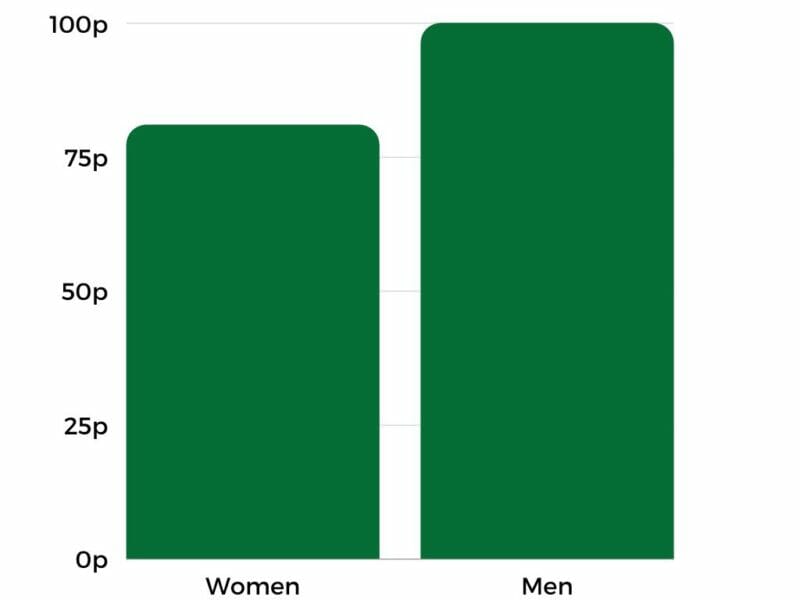
Data obtained from the UK Government’s Gender Pay Gap service for 2022/23, reveals that the median hourly pay gap between men and women working at the University of Exeter is 19p, or 18.6% lower.
Compared to other universities, the University has a higher pay gap, particularly in contrast to major London universities, with the London School of Economics having a 6p gap, the University of Birkbeck at 5p and the University of the Arts London having only a 2p gap.
“The gender pay gaps at our university and within Higher Education in the UK are unacceptable,” says Brian Rappert, the new President of the Exeter Branch of the University and College Union (UCU). “National industrial action undertaken in universities over the last academic year has sought to address pay inequalities, among other issues. Locally, into the future, the Exeter UCU will work with senior management as part of a wider joint framework agreed to redress gender and other pay inequalities.”
Exeter Students’ Guild also expressed a want for change: “[w]e’d like to see continuous improvement from the University in closing their gender pay gap. It’s good to see they have improved upon the 2021-22 report, but it is essential that this remains a priority for the University to resolve.”
Structural boundaries and the sustained gendering of subjects mean that male-dominated fields continue to garner higher wages.
However, there are many mechanisms that constitute the gender pay gap. Sources explain that a simple explanation has to do with men being more likely to study subjects that lead to higher-paying jobs. Structural boundaries and the sustained gendering of subjects mean that male-dominated fields continue to garner higher wages. The Institute for Fiscal Studies (IFS) research estimates that “studying economics at university boosts women’s pay by 75% by age 30; this is more than ten times the return to studying creative arts (7.2%).” It adds that “women make up to nearly two-thirds of creative arts graduates but less than a third of economics graduates.”
At the same time, the division of domestic labour plays a large role. Figures show that the wage gap widens dramatically after women have their first child. The gap is said to “widen consistently for 12 years after the first child is born, by which point women receive 33% less pay per hour than men.” The report maintains that when women take maternity leave or choose to work half-time to raise their family they “lose out on subsequent wage progression” allowing for men (and women who work full-time) to take in more hours and progress more in their field. Higher Education Staff Statistics (HESA) gathered during the 2021/22 year document that women accounted for 66% of part-time staff. The figure is actually higher at Exeter, with the part-time workforce being 71.4% female in 2022.
An unnamed source at the University of Exeter highlights that government pay gap data is based on median pay, meaning gaps can be skewed as women often hold jobs in lower-paid bands of the university. The gender pay gap differs from equal pay. Though the University of Exeter maintains it is “committed to paying equally for work of equal value”, gaps arise due to disparities in pay bands. At Exeter, women constitute 47% of the upper hourly pay quarter, yet occupy 65% of the lower hourly pay quarter.
At Exeter, women constitute 47% of the upper hourly pay quarter, yet occupy 65% of the lower hourly pay quarter.
The source also describes that whilst the University can rectify the pay gap to an extent, the UK government must also take structural action. Women must be provided with equal opportunities. The UK’s latest available figures depict an 8.3% gender pay gap among full-time employees. It also shows the gender pay gap is wider in every English region than in Scotland and Northern Ireland – two countries with left-leaning majorities. Though pay discrimination is illegal, there continues to be covert ways that discrimination occurs, from employers under-valuing the work of women, to a failure to promote women at the same rate as their male counterparts. The standard of ‘equal pay for equal work’ can be warped by these factors. Other common practices such as out-of-date job evaluations and non-payment of contractual bonuses during maternity leave can further disadvantage women in the workplace, perpetuating the pay gap.
Though pay discrimination is illegal, there continues to be covert ways that discrimination occurs, from employers under-valuing the work of women, to a failure to promote women at the same rate as their male counterparts.
A spokesperson from the University comments that “tackling the gender pay gap is a key priority.” They added that “[w]e continue to pay equal pay to work of equal value but recognise that there are further steps we need to take and work on this is underway through the Gender Equality Group.”
The University also states that there are mitigation methods in place, such as the 2024-29 institutional gender equality (Athena Swan) action plan, which has identified further actions to address the gender pay gap. The recently established Faculty and Professional Services Wellbeing, Inclusion and Culture Committees will be responsible for the action plan’s delivery. They further uphold that these actions will be carried out in collaboration with the new Women’s networks on both the Devon and Cornwall campuses, supported by improved data.
Despite the 2030 EDI mission to diminish the gender pay gap to a 5% difference, the University of Exeter is at present a reflection of structural gender divisions. Action is required to rectify disparities between men and women. Yet, as expressed by Brian Rappert, other pay gaps also remain as barriers to equality and will be subject to further investigation.


